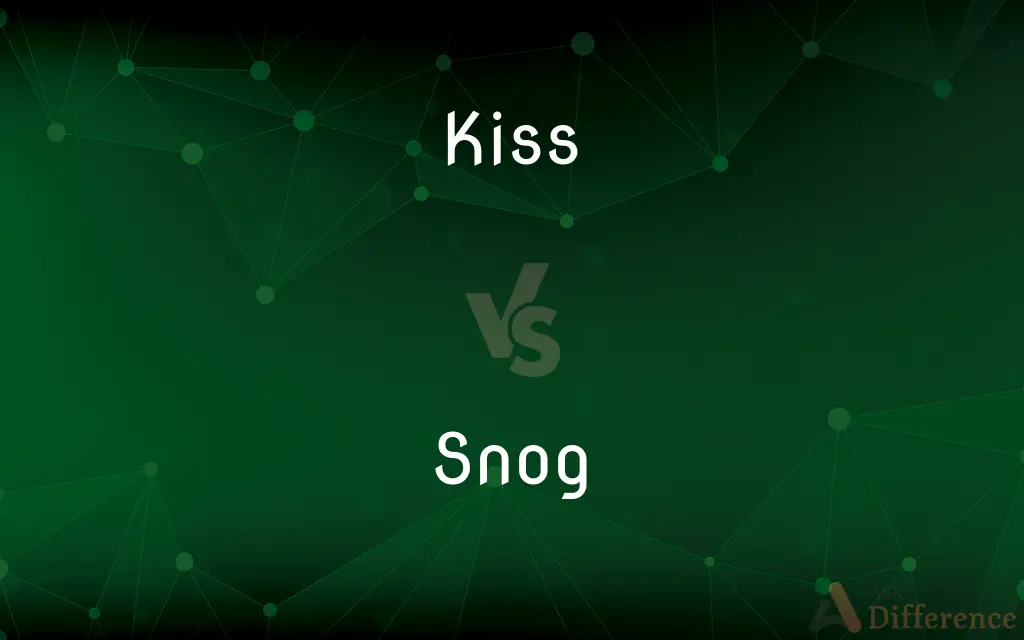Kiss vs. Snog — What's the Difference?
By Tayyaba Rehman & Fiza Rafique — Updated on April 22, 2024
"Kiss" is a universal term for pressing one's lips against someone or something, often to show affection; "snog" is a British informal term specifically for kissing passionately.

Difference Between Kiss and Snog
Table of Contents
ADVERTISEMENT
Key Differences
"Kiss" is used globally to describe the act of touching lips to another person's lips or skin, conveying a range of emotions from love to greeting. "Snog," on the other hand, is predominantly used in British English to imply a deep, more intense, and often lengthy kiss, typically with romantic implications.
In social contexts, a kiss can be appropriate as a polite gesture, such as kissing someone on the cheek when meeting. Whereas, a snog is considered a private, intimate action, not suitable for public or formal situations.
The term "kiss" appears in a variety of cultural, religious, and societal settings, symbolizing rites, respect, or affection. Snog is less versatile, typically confined to personal relationships and often carrying a playful or casual connotation.
Media and literature often use "kiss" to denote a broad spectrum of scenarios, from a mother’s peck on her child's forehead to a romantic kiss in a movie. Conversely, "snog" is usually reserved for scenarios depicting youthful or less formal romances, especially in British novels and films.
Instructional and educational materials might include advice on how to give a "kiss," considering its broader implications and acceptability. In contrast, discussions on how to "snog" would likely appear in more informal, perhaps even humorous contexts focused on dating and romantic advice.
ADVERTISEMENT
Comparison Chart
Definition
A touch with the lips as a sign of love, greeting, or reverence.
A long and passionate kiss, typically used informally in the UK.
Usage Context
Broad, including formal and familial settings.
Typically informal and romantic.
Cultural Ubiquity
Universal, recognized across different cultures.
Predominantly British, less recognized globally.
Connotation
Can range from affectionate to respectful.
Generally playful and intimate.
Variability in Length
Can be brief or prolonged.
Usually prolonged and intense.
Compare with Definitions
Kiss
A simple peck.
She gave her grandmother a quick kiss on the cheek.
Snog
A snog in media.
The film scene where the characters snog became iconic.
Kiss
A romantic kiss.
The couple shared a long kiss under the stars.
Snog
A playful snog.
They had a quick snog in the rain.
Kiss
A ritualistic kiss.
He kissed the holy book as a sign of respect.
Snog
A snog among youths.
Snogging is often a part of teenage love stories in British novels.
Kiss
A kiss of death.
The mafia boss gave him the kiss of death.
Snog
A make-out session.
The teenagers were caught snogging at the party.
Kiss
A kiss goodbye.
They shared a sorrowful kiss goodbye at the airport.
Snog
Kiss and cuddle amorously
He snogged my girl at a party
The pair were snogging on the sofa
Kiss
A kiss is the touch or pressing of one's lips against another person or an object. Cultural connotations of kissing vary widely.
Snog
A long kiss or a period of amorous kissing and cuddling
He gave her a proper snog, not just a peck
Kiss
(of a ball) lightly touch (another ball) in passing.
Snog
To kiss and caress amorously.
Kiss
A touch or caress with the lips
A quick kiss on the cheek
Snog
To kiss and caress (another) amorously.
Kiss
A slight touch of a ball against another ball.
Snog
To kiss passionately.
Kiss
A small cake, biscuit, or sweet.
Snog
A passionate kiss.
Kiss
To touch or caress with the lips as an expression of affection, greeting, respect, or amorousness.
Snog
Snuggle and lie in a position where one person faces the back of the others
Kiss
To touch lightly or gently
Flowers that were kissed by dew.
Kiss
To strike lightly; brush against
Barely kissed the other car with the bumper.
Kiss
To engage in mutual touching or caressing with the lips.
Kiss
To come into light contact.
Kiss
A caress or touch with the lips.
Kiss
A slight or gentle touch.
Kiss
A small piece of candy, especially of chocolate.
Kiss
A drop cookie made of egg whites and sugar.
Kiss
(transitive) To touch with the lips or press the lips against, usually to show love or affection or passion, or as part of a greeting.
Kiss
(ambitransitive) To (cause to) touch lightly or slightly; to come into contact.
The nearside of the car just kissed a parked truck as he took the corner at high speed.
His ball kissed the black into the corner pocket.
Kiss
(intransitive) Of two or more people, to touch each other's lips together, usually to express love or affection or passion.
Kiss
To treat with fondness.
Kiss
A touch with the lips, usually to express love or affection, or as a greeting.
Kiss
An 'X' mark placed at the end of a letter or other type of message, signifying the bestowal of a kiss from the sender to the receiver.
Kiss
A type of filled chocolate candy, shaped as if someone had kissed the top. See Hershey's Kisses.
Kiss
(astronomy) The alignment of two bodies in the solar system such that they have the same longitude when seen from Earth, conjunction.
Kiss
(aviation) A low-speed mid-air collision between the envelopes of two hot air balloons, generally causing no damage or injury.
Kiss
To salute with the lips, as a mark of affection, reverence, submission, forgiveness, etc.
He . . . kissed her lips with such a clamorous smack,That at the parting all the church echoed.
Kiss
To touch gently, as if fondly or caressingly.
When the sweet wind did gently kiss the trees.
Kiss
To make or give salutation with the lips in token of love, respect, etc.; as, kiss and make friends.
Kiss
To meet; to come in contact; to touch fondly.
Like fire and powder,Which as they kiss consume.
Rose, rose and clematis,Trail and twine and clasp and kiss.
Kiss
A salutation with the lips, as a token of affection, respect, etc.; as, a parting kiss; a kiss of reconciliation.
Last with a kiss, she took a long farewell.
Dear as remembered kisses after death.
Kiss
A small piece of confectionery.
Kiss
The act of caressing with the lips (or an instance thereof)
Kiss
A cookie made of egg whites and sugar
Kiss
Any of several bite-sized candies
Kiss
A light glancing touch;
There was a brief kiss of their hands in passing
Kiss
Touch with the lips or press the lips (against someone's mouth or other body part) as an expression of love, greeting, etc.;
The newly married couple kissed
She kissed her grandfather on the forehead when she entered the room
Kiss
Touch lightly or gently;
The blossoms were kissed by the soft rain
Common Curiosities
What is a kiss?
A kiss is the act of pressing one's lips against another person or an object, often as a form of affection or greeting.
How is a kiss typically depicted in different cultures?
Cultural depiction of a kiss varies widely; in some cultures, it's a common greeting, while in others, it may be reserved for private, romantic moments.
Can a kiss be non-romantic?
Yes, kisses can be non-romantic, such as a kiss on the cheek as a greeting or a sign of affection among family members.
Is it appropriate to use "snog" in formal writing?
"Snog" is generally considered too casual for formal writing and is better suited for informal conversations or creative writing that captures colloquial speech.
What role does kissing play in human biology?
Biologically, kissing can release endorphins and oxytocin, enhancing feelings of pleasure and bonding.
Are kissing and snogging the same?
While both involve kissing, snogging is specifically a passionate, often prolonged kiss, typically used in informal contexts.
Is snogging acceptable in public?
Snogging, given its intense and intimate nature, is generally considered less appropriate for public settings compared to a simple kiss.
How do people react to public displays of affection like snogging?
Reactions vary by cultural norms and personal beliefs; some may find public snogging acceptable, while others might consider it inappropriate.
What does snog mean?
Snog is a slang term used mainly in the UK to describe a deep and passionate kiss.
What are different types of kisses?
There are various types of kisses, including pecks, French kisses, cheek kisses, and air kisses, each varying in intimacy and cultural significance.
Why is kissing important in relationships?
Kissing can strengthen emotional bonds, express affection, and increase intimacy in romantic relationships.
Can "snog" have negative connotations?
In some contexts, "snog" might be viewed as overly casual or crude, particularly in cultures unfamiliar with British slang.
Is snogging common in all age groups?
Snogging is often associated with younger people, particularly teenagers and young adults, though it's not exclusive to any age group.
How do media and literature influence perceptions of kissing and snogging?
Media and literature can romanticize and normalize various forms of kissing, influencing societal attitudes towards what is considered acceptable or desirable.
Where did the term "snog" originate?
The term "snog" originated in British English and is thought to have derived from older colloquialisms related to snuggling or cuddling.
What is the etiquette for kissing in different social settings?
Kissing etiquette depends on cultural norms, the setting, and the relationship between the people involved; it ranges from a cheek kiss in formal settings to more intimate kisses in private.
Share Your Discovery

Previous Comparison
Cornpone vs. Johnnycake
Next Comparison
Cord vs. ChordAuthor Spotlight
Written by
Tayyaba RehmanTayyaba Rehman is a distinguished writer, currently serving as a primary contributor to askdifference.com. As a researcher in semantics and etymology, Tayyaba's passion for the complexity of languages and their distinctions has found a perfect home on the platform. Tayyaba delves into the intricacies of language, distinguishing between commonly confused words and phrases, thereby providing clarity for readers worldwide.
Co-written by
Fiza RafiqueFiza Rafique is a skilled content writer at AskDifference.com, where she meticulously refines and enhances written pieces. Drawing from her vast editorial expertise, Fiza ensures clarity, accuracy, and precision in every article. Passionate about language, she continually seeks to elevate the quality of content for readers worldwide.














































